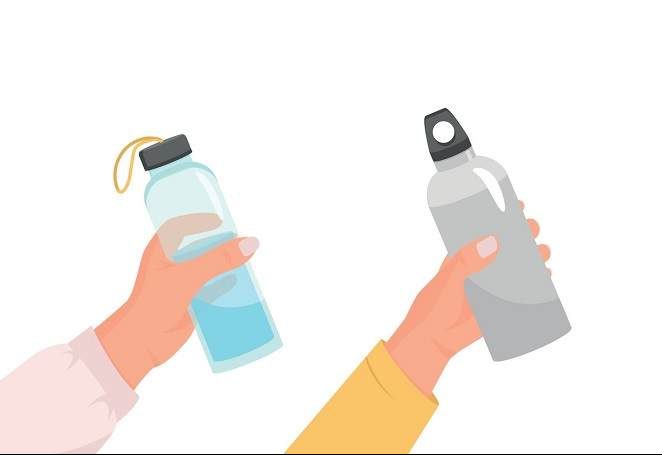
Reusable water bottles provide you with an easy way to stay hydrated while also making a fun fashion statement! When you have a reusable water bottle with you, it can encourage you to drink more water throughout the day, which is essential to staying healthy. But how do you know the best water bottle to choose? Between glass, plastic, and metal water bottle options, there are so many shapes, styles, and materials out there to choose from. Here’s everything you need to know about different types of water bottles, along with the pros and cons to help you make the best decision.
What Is the Best Water Bottle: Glass, Plastic, or Metal?
Different Types of Water Bottles
The three main types of water bottles include glass, plastic, and metal. Many people are interested in shifting away from single-use plastics to help reduce the strain on the environment. Learn more about these three types of water bottles, including what makes them popular choices and how they may affect the taste and experience of drinking water throughout the day.
Plastic Water Bottles
You can find cases of plastic water bottles at most local and chain stores, with a variety of brands and packaging to attract your attention. While these clear plastic water bottles may tempt you with their low prices, they are not actually meant to be reused. Plastic water bottles are primarily made of a plastic known as polyethylene terephthalate (PET), commonly used in food and beverage packaging. This type of plastic is not durable enough to withstand multiple uses, and bacteria can easily grow as the plastic starts to break down. There are also very few regulations on what type of water goes into plastic bottles, which means you may be drinking the equivalent of tap water. Some stores advertise reusable plastic water bottles that are BPA-free, though these can still warp over time.
Metal Water Bottles
Metal water bottles are often made of stainless steel or aluminum and come in a variety of shapes, sizes, and colors. Unlike plastic water bottles, metal water bottles do not have safety concerns as long as the stainless steel or metal water bottle is lead-free. Metal water bottles have the added benefit of insulation, which can help your cold drinks stay cold and hot drinks stay hot. Many metal water bottles also do not sweat, which means you are much less likely to lose your grip and spill your drink. However, some metal water bottle users say that water and other drinks kept in a metal bottle can have a metallic taste. It can also be difficult for people to find convenient options for recycling metal water bottles.
Glass Water Bottles
Glass bottles have been the container of choice for beverages for hundreds of years. Unlike plastic or metal bottles, glass does not impact the flavor at all. When you want to stay hydrated by drinking water throughout the day, you want that water to taste fresh and pure. Glass bottles are free of chemicals and safe to put in the dishwasher, which makes them a convenient choice for homes and offices. If you have young children, you may be worried about them breaking glass bottles. However, water bottle manufacturers are taking note of this and creating more durable options for glass water bottles to withstand potential drops. The thick glass of these water bottles makes them surprisingly resistant to cracks and breaks. Beyond these benefits, glass bottles are often considered the best water bottle material because they are 100% recyclable.
3 Reasons to Choose Glass Water Bottles
With so many plastic, metal, and glass water bottle options on the market, it can be difficult to know what to choose. Here are three reasons to choose glass water bottles.
Eco-Friendly
Glass water bottles are more eco-friendly than their plastic and metal counterparts. As more people become interested in reducing pollution and reusing recyclable materials, glass water bottles increase in popularity. Glass products are recyclable and can be remade using partially recycled materials. When you invest in glass water bottles, you can help in reducing the demand for single-use plastic water bottles or metal bottles that require chemicals and pollution to produce. Learn more about how you can choose glass water bottles to help reduce your carbon footprint.
Better Taste
Perhaps the easiest way to tell the difference between glass water bottles and other options is that water from a glass bottle just tastes better. Metal bottles can leave a metallic taste in your mouth, almost like there were pennies in your water. Skip the funky metal taste and go for the glass water bottle instead. Unlike other materials, flavors from different drinks won’t linger in glass water bottles. That means you can enjoy freshly squeezed lemonade one day and a glass of cold water the next without ever noticing any lingering flavors.
Durability
Many people are surprised to learn how durable glass water bottles can be. While stainless steel and metal water bottles have been known to last for years, they can also become more easily dented and scratched. Plus, metal bottles have that funky metallic flavor. Glass water bottles these days are designed with thick, quality glass designed to withstand drops and breaks. Glass products are also dishwasher safe, which is a major convenience when you want to invest in long-lasting, reusable products. The materials that make up glass water bottles do not degrade over time, so you can get the most bang for your buck when you invest in glass water bottles.
Next time you are out shopping for a reusable water bottle, check out glass as the safest bottled water option for both you and the environment. Glass water bottles also have the added benefit of looking great and matching your overall style and aesthetic. If you find yourself relying on your reusable glass water bottle to hydrate throughout the day, you may also want to consider a water delivery service for your home or office. Lipsey Water delivers refreshing mountain spring water in high-grade glass receptacles, making access to clean, fresh water even more convenient.
